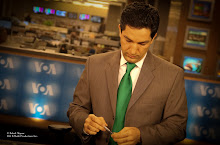Voice of America, PNN
By Siamak Dehghanpour and Babak Gorji
Dec 10 (Washington) –Syrian National Council (SNC) sees Iran not able to change the current situation in Syria despite its extensive support of the ruling government, but it wants Turkey to have bigger role in Syrian developments by moving in front line of any intervention by the West.
“Iran has a considerable role in Syria, but is not able to change the current situation alone,” Monzer Makhous, the vice-president of the SNC’s International Affairs Commission, said in an interview with the Voice of America (VOA) stressing that “we should work with other parties, not with Iran.”
Damascus has had close ties with Tehran since the early years of the Islamic Republic of Iran, founded in 1979 and a downfall of President Bashar Assad could deal a strategic blow to regional Shi'ite power Iran, where confrontation toward Israel remains one of its overriding foreign policy principles.
“We are not hopeful about Iran at all,” Makhous said in the VOA’s Persian news talk Ofogh (Horizon) stressing that the SNC has had no contacts with Iranian officials over the recent developments in Syria as Iran provides an indefinite support of the Syria’s ruling power.
Iran denies any involvement in matters of the Syrian state and has called the unrest against Assad an "American-Zionist" conspiracy. There were rumors suggesting that Iranian officials have met members of the Syrian opposition in an effort to probe the possibility of forming future alliances.
When Ankara condemned its former ally Assad over the military crackdown on protesters, Tehran has become more cautious in its approach to Syria's crisis, condemning his use of violence and urging both the government and the opposition to reach a “mutual understanding”.
Syria said Monday it would conditionally agree to allow Arab League observers into the country as part of a plan to end almost nine months of bloodshed. The cancellation of the recently imposed sanctions by the Arab League was among the conditions raised by Syria. Arab League rejected the conditions and the Syrian opposition accused the ruling government of wasting time.
Turkey, the Syria’s biggest trade partner, suspended all its financial credit dealings with that country and froze its government’s assets, joining the Arab League last week in isolating Assad’s regime over its violent crackdown on protestors.
“Turkey’s position is very important. Turkey should be in front of any possible interference by the West,” Makhous said adding that the Council is against any military intervention at this stage but it favors a limited assistance like creating a buffer zone to host the refugees inside Syria.
Ankara has talked openly about the need to be ready for any scenario, including setting up a buffer zone to contain any mass influx of refugees. Thousands, including Syrian army defectors, are already housed in camps on the Turkish side of the border.
Turkey, the Muslim NATO member, has not only joint borders with Syria but with Iran which is at odds with the West over its nuclear ambitious. Turkey has deepened economic and financial ties with Iran in recent years, despite Western efforts to step up economic pressures on the Islamic state.

Despite Ankara’s opposition against the latest round of the U.N. sanctions on Tehran, Turkey announced its agreement in September to deploy a NATO missile defense system on its territory aimed at protecting NATO members from the threat of Iranian missiles.
Iran decried the decision and a top Revolutionary Guards commander warned last month that his country could target installations in Turkey if it faces a threat.
“We are used to hearing such language of threat from Iranian officials, but that rhetoric does not find that audience in Ankara,” Erol Aslan Cebeci, the executive director of the Foundation for Political, Economic and Social Research (SETA) at Washington, D.C. said in the same Ofogh program of the VOA.
“Turkey and Iran … had a long history of trade, cultural and political relations, but in the past one and half year, it moved to a direction which cannot reach a better future,” the former member of the Turkish parliament continued.
Iranian and Turkish officials have not denied the two countries differences over the Syria’s unrest, but the two major non-Arab Muslim states are competing for influence in the now changing Middle East and each one presents itself as a model, one Islamic and the other secular.
Asking whether he is optimistic about a diplomatic solution for Syria, Cebeci replied: “if Russia and China show more flexibility … and if Iran realizes its support of Syria will cost much when it can enjoy a good interaction with post-Assad government, then it would not be difficult to see positive changes in Syria.”




هیچ نظری موجود نیست:
ارسال یک نظر